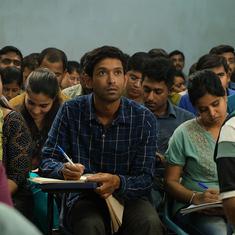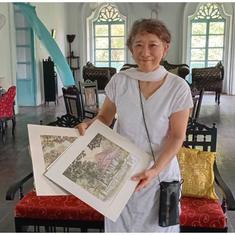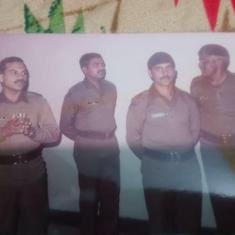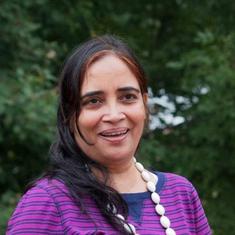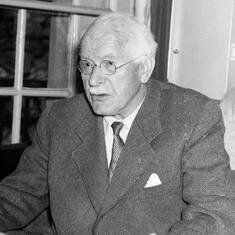Bindu decided to become a nun when she was 16. Eleven years later, the day she turned 27, she decided she had had enough and left the order. “As I got older, I started to question, to reason,” she said. “I figured the best way for me was out.”
But when she returned to her family in North Kerala, confident that they would welcome support her, she was in for a shock.
“Far from being on my side, they were horrified,” she said. Even her younger brothers and sisters, some of whom were unmarried, showed no sympathy. “My family said I brought shame upon them by leaving... humiliated them.”
More than half of India’s Catholic priests and nuns come from Kerala – indeed, the majority of the Indian clergy serving in other countries are also from this South Indian state. A household where a family member is a priest or a nun is held in high regard by society here. Leaving the congregation here is not seen as exercising personal choice but an act of cowardice, one that is frequently penalised by denying ex-clergy members the right to their property.
This was how Bindu’s family justified their actions too: “They said because I had taken a vow of poverty when I joined the church, my share had been given to my siblings. This didn’t change even though I had left the convent.”
It was the beginning of a long struggle. Bindu had no savings because while in the convent, anything the clergy earned was to be given to their superiors. Once in the outside world, she had to survive in wretched poverty, hungry and hopeless.
Redemption is now a possibility – in June, the Kerala High Court ruled that Christian priests and nuns must be given an equal share in the division of ancestral property despite their vow of poverty. But orders that believe the Pope to be the representative of Christianity see this judgement as directly opposing Canon Law.

Hard times
The recent ruling was in favour of a priest whose relatives fought with him over property – the case first went to court in 1996 and the priest died soon after. As is frequently the case in India, the legal process took 21 years to take its course.
“This is an historic ruling,” said Sabu George, the lawyer for the priest. “The court considers a person in a religious order an individual with civil rights. The ruling overturns the idea that those in a religious order are not entitled to anything.”
In its judgement, the High Court said a priest can relinquish property if he wishes to, but there can be no “automatic deprivation” because he’s in a religious order and has “renounced worldly pleasures”. The ruling applies to all religions in Kerala and to women in religious orders as well.
It has a real bearing on some Christian orders. Under the Canon Law, monks must take the vows of poverty, celibacy and obedience – if any of these are broken, a priest or a nun has to leave the congregation.
Monastic life
“Where this judgement fails is that it does not take into account the cenobitic or communal way of congregational living,” said Father Paul, a senior Catholic priest and former spokesperson of the Syro-Malabar Church. While the priest’s case was a property dispute between two parties, Father Paul objected to way in which the High Court decided to deal with wider issues in its verdict.
“The judgement will affect thousands of monasteries and convents,” Father Paul said. “A monk or nun that takes a vow of poverty can handle money or take a salary but the difference is that he or she gives the money away, and has no private property. This is the cenobitic life, where ownership is common and everyone in the cenobium is taken care of.”

In 1954, the Indian Supreme Court ruled that any individual who entered a religious order or becomes a sanyasi dies a “civil death” – in other words, sanyasis or monks of any religious order effectively had no civil rights.
Senior clergy said that the stand the High Court has taken is in contradiction of the Supreme Court’s ruling, in that it sees no meaning in civil death. A senior priest told Scroll.in that the ruling would mean that the personal property of a bishop, provincial or superior general who died without will, could be claimed by the family.
“This can destroy the very existence of monastic and convent life,” he said.
Some nuns and priests also said that they would challenge the ruling, “because it does not consider or indeed value detachment from property and worldly life”.
But there already exist several cases of priests fighting their families because they weren’t given their rightful share. Father Peter, a senior clergy in an affluent congregation, said: “While my six brothers were given an acre of land each, I was given much less just because I’m a priest. I won’t give up.”
![Representational photo. Photo credit: Mathen Payyappilly Palakkappilly/Wikimedia Commons [Licensed under CC-BY-SA-4.0]](https://sc0.blr1.digitaloceanspaces.com/inline/843273-vncgqbxbzg-1500884747.jpg)
Father Shibu KP, of the National Association of Catholic ex-priests and nuns, said he was pleased with the verdict. “In a lot of cases, when parents divide the ancestral property, they leave out the child who’s a priest or a nun,” he said. “Quite a few of those who choose to leave the congregation, fall on bad times.”
In fact, Father Shibu wants the law to be amended further: “There should also be a section…to say that on the clergy’s death, the property should go to society.”
For Father Tom, the High Court’s ruling is too little, too late: “My father left me an equal share of the ancestral property, but he did not make a will,” he said. “It was an oral agreement that my older brother would look after it for me.” As time went by, the brother sold Father Tom’s share of the land, without his consent. “It was something our father kept for me for a rainy day, in case I left the congregation. This caused me a lot of heartache and emotional turmoil...” Would he contest his brother’s sale now? “I’m a peace-loving man. I would never rock the boat.”
For Bindu as well, the verdict will not heal the scars left by her experiences.
During her time with the church, she had trained as a nurse but thereafter, work was difficult to come by. “Nobody wanted to take in a 37-year-old woman who had left the convent. I didn’t have friends in the outside world. Relatives disowned me.” Seventeen years later, Bindu is teaching in a college and is slightly better off.
“I have lived in abject poverty, I didn’t have money to eat,” she recalled, adding that the experience if one that is both mentally and physically hard to recover from. She still suffers from poor health. “I dropped my father’s name from my name. He let me down so much that I haven’t been able to live a normal life.”

